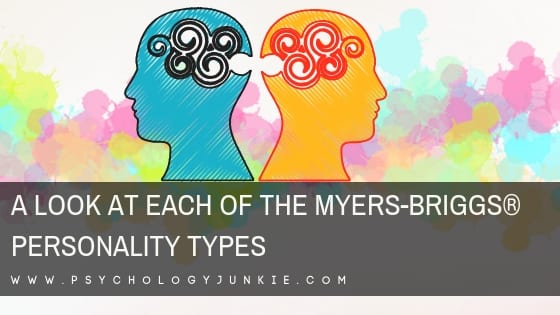Here’s What It’s Like Inside the Mind of an INFJ, INTJ, ENFJ or ENTJ
Have you ever wondered how other personality types REALLY think? Sure, we can read lots of descriptions about how to identify the types or what their strengths might be, but what is it like inside their head? That’s what today’s article is about! A few days ago we talked about the mind of the NP personality types and today we’re going to take a close look at each of the Intuitive-Judging (or NJ) personality types. These personality types all view the world through a mental process called Introverted Intuition, or “Ni” for short. Introverted intuition looks for the underlying meanings or hidden connections behind everything that happens in the world. Ni-users are very big-picture oriented, they want to envision how things will play out in the future, and they usually do so with a sense of certainty and uncanny insight. Ni-users are attracted to the abstract, conceptual, and symbolic more than the literal and concrete. Let’s get into more detail in the individual descriptions below!
Not sure what your personality type is? Take our new personality questionnaire!

Here’s What It’s Like to be Inside the Mind of an INFJ, INTJ, ENFJ or ENTJ
The INFJ
INFJs often feel like they have about a hundred social studies going on in their mind at any given time. They are constantly revising and expanding their ideas about human nature and trying to understand how people think and how each person affects another. These types are more focused on figuring out what’s going on behind-the-scenes than what’s happening directly in front of them. This can make them seem absent-minded to some and mystical to others. They are also more focused on what could happen fifteen years from now than five minutes from now. Pattern-oriented and drawn to underlying themes and trends, INFJs usually pick up on future implications quickly if they’re allowed to be themselves and are encouraged in their strengths. This can be difficult at times because INFJs are a rare personality type and their way of functioning is often misunderstood by the people closest to them. As children they are often told to “snap back” into reality or focus on the present rather than muse about theories and future possibilities. For INFJs it can seem as if there’s a little voice in the back of their mind constantly asking, “What does this REALLY mean?” Their tendency to question things and look deeper makes them skeptical in many cases. They have an inner “devil’s advocate” that questions everything. They don’t like to disrupt the harmony of the people they are with so they may not outwardly challenge others beliefs or assumptions, but inside they can be very quick to take apart something’s meaning or hidden motive. They are usually aware of the underlying emotions that drive someone’s behavior and so they are good at “reading” people and adjusting to the environment they are in.
Other Key Features:
- They often use symbols and metaphor easily in speech
- They are insightful into what is happening beneath the surface
- They are good at thinking outside-the-box
- They are skilled at picking up on emotional cues and needs
- They have a gift for strategy
- Their insights often come to them in an unpredictable way
- They want to understand the big picture and meaning of life
Read This Next: 3 Weird and Wonderful Secrets About the INFJ
The INTJ
Abstract and future-oriented, INTJs are on a constant quest for meaning. Understanding the cosmic significance and underlying pattern behind everything they see is vital to them. They want to make sense of how complex systems and mechanisms work – they want to take apart existing systems and beliefs and venture into uncharted theoretical territory. Although not naturally focused on other people’s emotions to a strong degree, they can usually size up someone rather quickly. Their tendency to look beneath-the-surface and see underlying meanings and motives makes them uncannily quick to spot inauthenticity or manipulation. The thoughts of the INTJ are permeated with symbolic imagery and visuals. They tend to have insights and pictures that come to them “out-of-the-blue” in a sense. These pictures are a culmination of thoughts, ideas, and sensory data that have been synthesizing and mulling about in their brain for minutes, hours, or even days. These insights guide them and give them a strong sense of purpose in whatever they’re doing. Without this insight, or an understanding of the scope, nuances, and implications of a project they can feel unmotivated. They want to know that whatever they’re doing has a lasting impact in the future.
Other Key Features:
- They are skilled at communicating through abstractions, symbols, and metaphor
- They have a gift for de-coding abstract or symbolic art
- They enjoy a mental challenge
- They are good at grasping context quickly
- Are often direct and blunt in their speech
- They are skilled at using logic and creating effective, strategic plans
- They are good at prioritizing and outlining projects
- They believe in equality and justice
Read This Next: 5 Reasons Why You’d Need an INTJ During a Zombie Apocalypse
The ENFJ
Insightful into the motivations and needs of others, ENFJs are the quintessential teachers and counselors. They are always seeking to understand what is important to the people around them, to find hidden talents, gifts, and abilities that can be harnessed to their best potential. When the people around them are happy and unified they tend to feel at peace and motivated. When the people around them are in conflict or emotional turmoil, they tend to feel conflicted and stressed. ENFJs take on the emotions of other people with an alarming accuracy, and this tendency can be exhausting at times. When exhausted by the influx of other people’s emotions ENFJs often seek solitude where they can let their mind wander over theories, abstractions, concepts, and meanings. They want to understand the over-arching purpose of life, the underlying threads that tie everything together. They want to organize each moment of their time to achieve a goal that will benefit humanity in some way. ENFJs don’t usually spend massive amounts of time alone, however. Time with others is stimulating to them, and being around people usually inspires some of their greatest ideas and visions.
Other Key Features:
- They are skilled at seeing relationships and connections between people
- They are naturally aware of what will trigger conflict or tension
- They are usually tactful and aware of what is socially expected and appropriate
- They are skilled in strategically organizing people to achieve harmony and unified purpose
- They are insightful about future implications and possibilities
- They are generally organized and planful
- They are gifted at helping other people emotionally, spiritually, or physically
Read This Next: The Top 7 Gift Ideas for ENFJs
The ENTJ
Goal-oriented and motivated, ENTJs believe in taking care of people by creating effective systems and plans. They are highly analytical and insightful, able to anticipate how events will unfold and which scenarios are most likely to work or fail. They seek clarity through organizing their outer world, having a methodical system, and creating contingency plans in case of failure. They get a sense of satisfaction from crossing an item off a to-do list or completing something they’ve started. This sense of satisfaction drives them to be competent and productive. In fact, it drives them crazy when there is a lack of logical order, when people procrastinate, or are wishy-washy and inefficient. In these situations they will confront people directly without mincing words or sugarcoating. This can make them appear harsh, but in their mind playing the “bad guy” is the best thing to do if it has a positive impact for everyone. Creating structure is something they naturally do and they tend to start every project by making an internal outline of how they want it to go. When it comes to their insights they are often aware of what’s happening behind-the-scenes. They notice more background material than many other types, picking up on underlying meanings quickly and trying to foresee implications, patterns, and trends. Philosophical conversation is often something that stimulates them because it allows them to consider the meaning behind life and the big-picture purpose of everything experienced on earth. These types like contemplating theories, concepts, and abstractions and enjoy people who can think along these lines.
Other Key Features:
- They believe in truth, equality, and justice to a strong degree.
- They are good at giving people a starting place for their work if they’re confused.
- They enjoy organizing ideas and information so that they make sense to other people.
- They are good at creating laws, rules, and regulations that ensure everyone is treated fairly.
- They are gifted at using symbols and metaphor in speech or writing.
- They naturally see future implications and possibilities.
- They are usually decisive and direct.
- They are naturally objective and logical.
Read This Next: 10 Things You’ll Relate to if You’re an ENTJ
What Are Your Thoughts?
Find out more about your personality type in our eBooks, The INTJ – Understanding the Strategist, Discovering You: Unlocking the Power of Personality Type, The INFJ – Understanding the Mystic, and The INFP – Understanding the Dreamer. You can also connect with me via Facebook, Instagram, or Twitter!















100% sure I’m an entj now, thanks